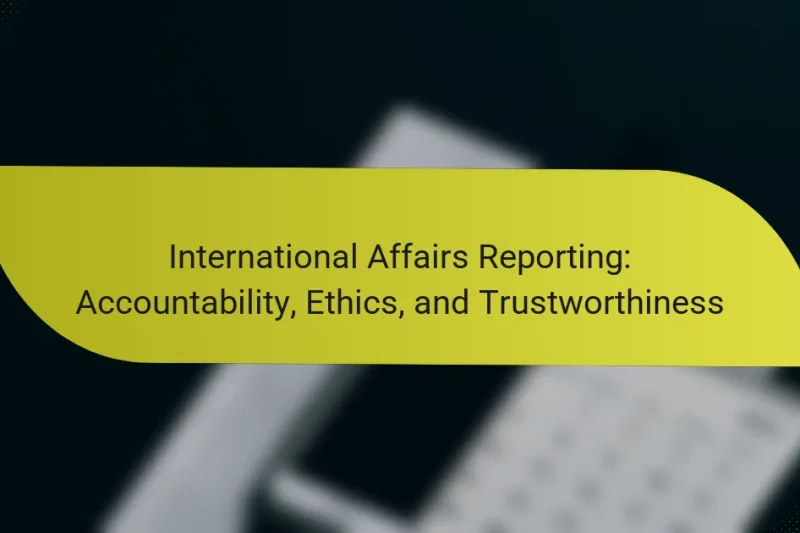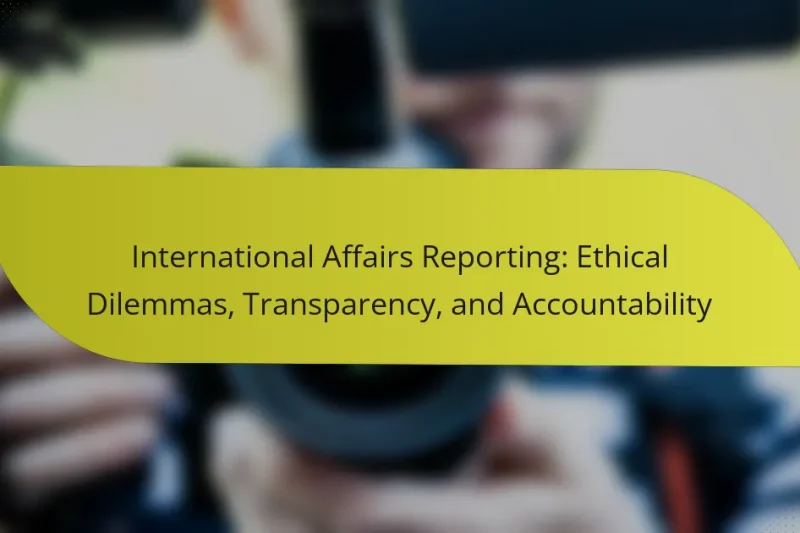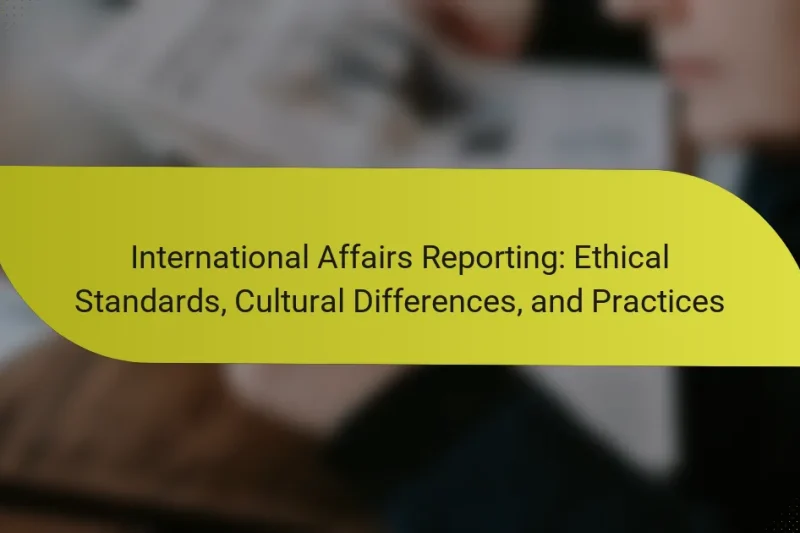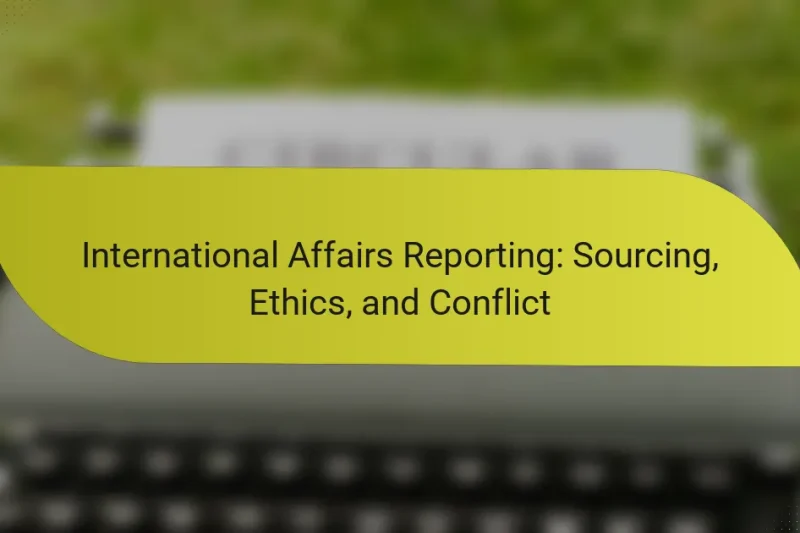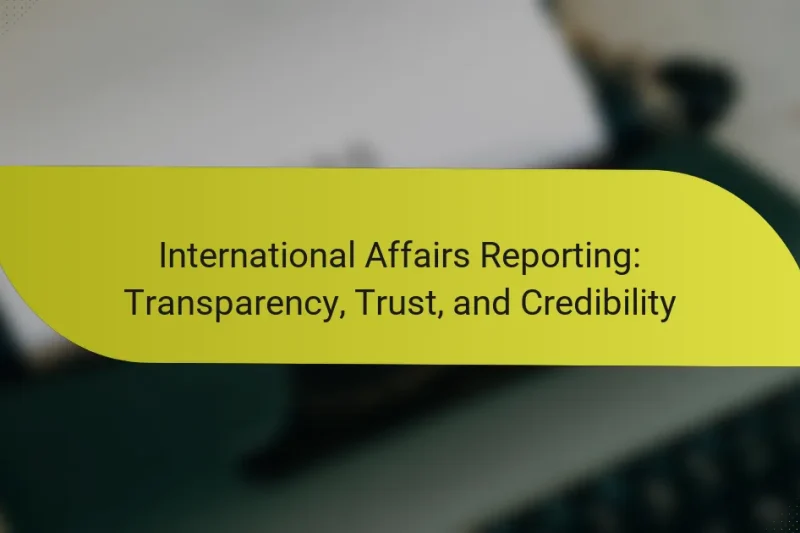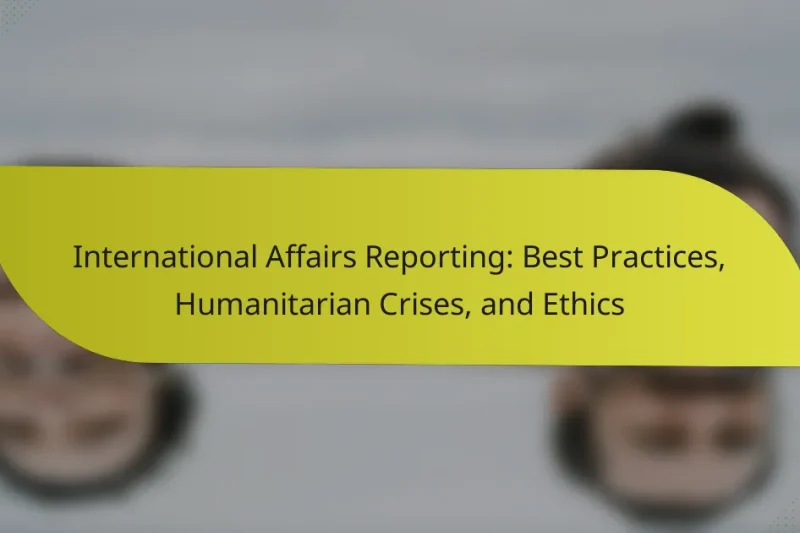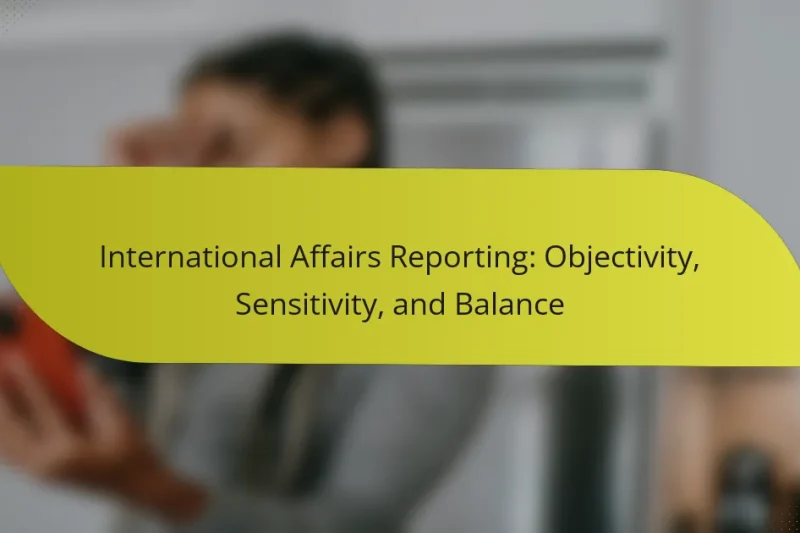International affairs reporting plays a vital role in promoting accountability and trustworthiness through adherence to rigorous … International Affairs Reporting: Accountability, Ethics, and TrustworthinessRead more
Ethical Considerations in International Affairs
Ethical considerations in international affairs are essential for guiding the interactions and decisions of nations on the global stage. Various ethical frameworks, such as utilitarianism and deontological ethics, influence how countries approach conflict resolution and uphold moral responsibilities. Additionally, international organizations play a vital role in establishing standards that promote justice, human rights, and accountability among member states.
International Affairs Reporting: Ethical Dilemmas, Transparency, and Accountability
International affairs reporting is fraught with ethical dilemmas that challenge journalistic integrity and public trust, including … International Affairs Reporting: Ethical Dilemmas, Transparency, and AccountabilityRead more
International Affairs Reporting: Ethical Standards, Cultural Differences, and Practices
International affairs reporting demands a commitment to ethical standards that prioritize accuracy, fairness, and responsibility in … International Affairs Reporting: Ethical Standards, Cultural Differences, and PracticesRead more
International Affairs Reporting: Sourcing, Ethics, and Conflict
International affairs reporting requires a commitment to sourcing reliable information from credible entities such as government … International Affairs Reporting: Sourcing, Ethics, and ConflictRead more
International Affairs Reporting: Transparency, Trust, and Credibility
International affairs reporting plays a crucial role in promoting transparency by delivering clear and accessible information … International Affairs Reporting: Transparency, Trust, and CredibilityRead more
International Affairs Reporting: Best Practices, Humanitarian Crises, and Ethics
International affairs reporting requires a dedication to accuracy, cultural sensitivity, and ethical standards, enabling journalists to … International Affairs Reporting: Best Practices, Humanitarian Crises, and EthicsRead more
International Affairs Reporting: Objectivity, Sensitivity, and Balance
International affairs reporting demands a commitment to objectivity, sensitivity, and balance to effectively inform audiences about … International Affairs Reporting: Objectivity, Sensitivity, and BalanceRead more
What ethical frameworks guide international relations?
Several ethical frameworks shape international relations, including utilitarianism, deontological ethics, and virtue ethics. These frameworks provide different perspectives on how nations should interact, make decisions, and uphold moral responsibilities in the global arena.
Utilitarianism in diplomacy
Utilitarianism focuses on the greatest good for the greatest number, guiding diplomatic decisions towards outcomes that maximize overall well-being. In practice, this may involve weighing the benefits and harms of policies or actions to determine their ethical justification.
For example, a government might support a trade agreement that boosts economic growth for millions, even if it negatively impacts a smaller group. The challenge lies in accurately assessing the consequences and ensuring that the benefits outweigh the costs.
Deontological ethics in treaties
Deontological ethics emphasizes the importance of rules and duties, asserting that certain actions are inherently right or wrong regardless of their outcomes. In the context of treaties, this approach prioritizes adherence to legal obligations and moral principles over the potential benefits of breaking them.
For instance, a country may refuse to engage in espionage against a treaty partner, valuing trust and integrity over short-term strategic advantages. This approach can foster long-term relationships but may limit flexibility in negotiations.
Virtue ethics in foreign policy
Virtue ethics centers on the character and intentions of decision-makers, advocating for policies that reflect moral virtues such as honesty, courage, and compassion. In foreign policy, this framework encourages leaders to consider how their actions align with their values and the moral implications of their choices.
For example, a nation may prioritize humanitarian aid in its foreign policy, reflecting a commitment to compassion and support for those in need. This approach can enhance a country’s reputation and build goodwill but may require balancing competing interests and resources.
How do ethical considerations impact conflict resolution?
Ethical considerations play a crucial role in conflict resolution by guiding the principles and practices that negotiators and mediators adopt. They influence decision-making processes, promote fairness, and help build trust among conflicting parties.
Negotiation strategies
Effective negotiation strategies incorporate ethical considerations by prioritizing transparency, respect, and mutual benefit. Parties should aim for win-win outcomes, where each side feels heard and valued, which can lead to more sustainable resolutions.
Common strategies include active listening, where negotiators genuinely engage with the other party’s concerns, and collaborative problem-solving, which focuses on finding solutions that satisfy both sides. Avoiding aggressive tactics can prevent escalation and foster a more constructive dialogue.
Third-party mediation
Third-party mediation involves an impartial mediator who facilitates discussions between conflicting parties, emphasizing ethical standards throughout the process. Mediators should maintain neutrality and confidentiality to build trust and encourage open communication.
When selecting a mediator, consider their experience and familiarity with the cultural context of the conflict. Effective mediators often employ techniques such as reframing issues and encouraging empathy, which can help parties see beyond their positions and work towards a resolution that respects everyone’s interests.
What role do international organizations play in ethics?
International organizations are crucial in establishing and promoting ethical standards in global affairs. They create frameworks that guide member states in adhering to principles of justice, human rights, and accountability.
United Nations ethical guidelines
The United Nations (UN) has developed a set of ethical guidelines aimed at fostering peace, security, and human rights. These guidelines emphasize the importance of respect for international law and the protection of vulnerable populations.
Key principles include the responsibility to protect (R2P), which asserts that states must protect their populations from genocide, war crimes, and crimes against humanity. The UN encourages member states to incorporate these ethical standards into their national policies and practices.
International Criminal Court’s ethical standards
The International Criminal Court (ICC) upholds ethical standards by prosecuting individuals for serious international crimes such as genocide and crimes against humanity. The ICC’s ethical framework is designed to ensure fair trials and the protection of victims’ rights.
By adhering to principles of impartiality and justice, the ICC aims to deter future atrocities and promote accountability. States are encouraged to cooperate with the ICC to strengthen the enforcement of these ethical standards globally.
How can countries balance national interests with ethical obligations?
Countries can balance national interests with ethical obligations by prioritizing diplomacy and mutual respect while considering the implications of their actions on global stability and human rights. This often involves making difficult trade-offs between economic benefits and moral responsibilities.
Case studies of ethical dilemmas
One notable case is the arms trade, where countries must decide whether to supply weapons to regimes with questionable human rights records. For instance, nations may face backlash for supporting governments that oppress their citizens, even if it serves strategic interests.
Another example is the refugee crisis, where nations grapple with the ethical obligation to provide asylum versus the perceived threat to national security. Countries like Germany have accepted large numbers of refugees, leading to both humanitarian praise and domestic political challenges.
Strategies for ethical diplomacy
Effective ethical diplomacy involves transparent communication and collaboration with international organizations. Countries should engage in dialogue to understand the perspectives of others and seek common ground on contentious issues.
Additionally, implementing frameworks such as the United Nations Sustainable Development Goals can guide nations in aligning their national interests with global ethical standards. Regular assessments and public accountability can help maintain this balance and build trust among nations.
What are the challenges of ethical decision-making in international affairs?
Ethical decision-making in international affairs faces numerous challenges, including conflicting national interests, cultural differences, and the complexity of global issues. These factors often complicate the ability to make decisions that align with ethical standards while also addressing practical realities.
Realpolitik vs. ethical considerations
Realpolitik emphasizes practical and strategic considerations over moral or ethical concerns, often prioritizing national interests above all else. This approach can lead to decisions that may undermine human rights or international norms, as leaders may justify unethical actions in the name of political expediency.
Balancing realpolitik with ethical considerations requires careful evaluation of potential outcomes. For example, a government might choose to support a regime with a poor human rights record for strategic advantages, but this can damage its reputation and relationships with allies. Leaders must weigh the long-term implications of their choices against immediate gains.
Corruption and ethical breaches
Corruption poses a significant challenge in international affairs, as it can lead to unethical decision-making and undermine trust in institutions. Corruption may manifest in various forms, including bribery, embezzlement, and favoritism, often affecting aid distribution and international agreements.
To combat corruption, organizations and governments can implement strict transparency measures and accountability frameworks. For instance, adopting international anti-corruption treaties and establishing independent oversight bodies can help mitigate unethical practices. Additionally, fostering a culture of integrity within institutions is crucial for promoting ethical behavior in international dealings.
How do cultural differences influence ethical perspectives in international relations?
Cultural differences significantly shape ethical perspectives in international relations by affecting how nations perceive values, responsibilities, and rights. These variations can lead to misunderstandings and conflicts, making it essential to recognize and navigate these differences in diplomatic engagements.
Cross-cultural ethical frameworks
Cross-cultural ethical frameworks provide a structured way to understand how different cultures approach morality and ethics. For instance, Western cultures often emphasize individualism and personal rights, while many Eastern cultures may prioritize community welfare and collective harmony. This divergence can lead to varying interpretations of justice, fairness, and responsibility in international dealings.
When engaging in international relations, it is crucial to consider these frameworks. Diplomats and policymakers should familiarize themselves with the ethical standards prevalent in their counterparts’ cultures to foster mutual respect and understanding. Utilizing tools like cultural competence training can enhance this awareness.
Case studies of cultural conflicts
Case studies illustrate how cultural conflicts can arise from differing ethical perspectives. One notable example is the clash between Western and Middle Eastern views on human rights. While Western nations may advocate for individual freedoms, some Middle Eastern countries prioritize social stability and traditional values, leading to tensions in diplomatic discussions.
Another example is the differing approaches to environmental policies. In some cultures, economic development may take precedence over environmental concerns, while others may prioritize sustainability. Understanding these cultural contexts can help negotiators find common ground and develop solutions that respect diverse ethical viewpoints.
